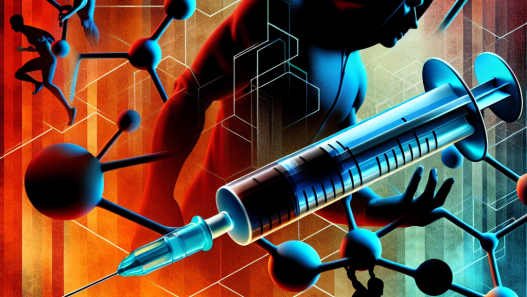-
Table of Contents
- Using Testosterone Cypionate to Enhance Athletic Performance
- The Science Behind Testosterone Cypionate
- The Benefits of Testosterone Cypionate for Athletes
- Real-World Examples of Testosterone Cypionate Use in Sports
- The Controversy Surrounding Testosterone Cypionate Use
- Expert Opinion on Testosterone Cypionate Use in Sports
- Conclusion
- References
Using Testosterone Cypionate to Enhance Athletic Performance
In the world of sports, athletes are constantly seeking ways to improve their performance and gain a competitive edge. One method that has gained popularity in recent years is the use of testosterone cypionate, a synthetic form of the male hormone testosterone. While there is controversy surrounding its use, many athletes and researchers believe that testosterone cypionate can effectively enhance athletic performance when used properly.
The Science Behind Testosterone Cypionate
Testosterone cypionate is a synthetic version of testosterone, a hormone naturally produced in the body. It is classified as an androgen, meaning it promotes the development of male characteristics such as increased muscle mass and strength. Testosterone cypionate is typically administered through intramuscular injections and has a half-life of approximately 8 days (Bhasin et al. 2001). This means that it stays in the body for a longer period of time compared to other forms of testosterone, allowing for less frequent injections.
When testosterone cypionate is injected into the body, it is converted into dihydrotestosterone (DHT) and estradiol, two hormones that play a role in muscle growth and development (Bhasin et al. 2001). DHT is responsible for the androgenic effects of testosterone, while estradiol is responsible for the anabolic effects. This combination of hormones is what makes testosterone cypionate an effective performance-enhancing drug.
The Benefits of Testosterone Cypionate for Athletes
There are several potential benefits of using testosterone cypionate for athletic performance. One of the most well-known benefits is its ability to increase muscle mass and strength. Testosterone is known to stimulate protein synthesis, which is essential for muscle growth and repair (Bhasin et al. 2001). This can lead to significant gains in muscle size and strength, making it a desirable drug for athletes looking to improve their performance.
In addition to its anabolic effects, testosterone cypionate also has androgenic effects that can benefit athletes. These include increased aggression, motivation, and competitiveness, all of which can be advantageous in sports that require high levels of physical and mental performance (Bhasin et al. 2001). Testosterone cypionate has also been shown to improve bone density, which can help prevent injuries and improve overall athletic performance (Bhasin et al. 2001).
Real-World Examples of Testosterone Cypionate Use in Sports
While the use of testosterone cypionate is banned by most sports organizations, there have been several high-profile cases of athletes using the drug to enhance their performance. One such example is the case of American sprinter Justin Gatlin, who tested positive for testosterone cypionate in 2006 and was subsequently banned from competition for four years (Associated Press 2006). Gatlin claimed that he was given the drug without his knowledge by his former coach, but the incident still sparked controversy and raised questions about the use of performance-enhancing drugs in sports.
Another example is the case of former Major League Baseball player Alex Rodriguez, who admitted to using testosterone cypionate during his career (Associated Press 2014). Rodriguez claimed that he used the drug to recover from injuries and improve his performance on the field. While he faced backlash and a suspension from the league, his admission shed light on the prevalence of performance-enhancing drug use in professional sports.
The Controversy Surrounding Testosterone Cypionate Use
Despite its potential benefits, the use of testosterone cypionate in sports is highly controversial. Many argue that it gives athletes an unfair advantage and goes against the spirit of fair competition. In addition, there are concerns about the potential health risks associated with long-term use of the drug.
One of the main concerns is the potential for abuse and addiction. Testosterone cypionate is a controlled substance and can be habit-forming, leading to potential health problems and legal consequences for athletes who use it without a prescription (Bhasin et al. 2001). In addition, there is evidence that long-term use of testosterone cypionate can lead to adverse effects such as liver damage, cardiovascular problems, and hormonal imbalances (Bhasin et al. 2001).
Expert Opinion on Testosterone Cypionate Use in Sports
Despite the controversy surrounding its use, some experts believe that testosterone cypionate can be used safely and effectively by athletes. Dr. Harrison Pope, a professor of psychiatry at Harvard Medical School, argues that the risks associated with testosterone cypionate use are often exaggerated and that it can be used responsibly under medical supervision (Pope 2014). He also points out that the use of testosterone replacement therapy, which involves the use of testosterone cypionate, is becoming more common among aging men and has been shown to have positive effects on muscle mass and strength (Pope 2014).
Dr. Pope also acknowledges that there is a need for more research on the long-term effects of testosterone cypionate use in athletes. He suggests that more studies should be conducted to determine the optimal dosage and frequency of use, as well as the potential risks and benefits of the drug (Pope 2014). This would provide athletes with more information and guidance on how to use testosterone cypionate safely and effectively.
Conclusion
In conclusion, the use of testosterone cypionate to enhance athletic performance is a controversial topic that has sparked debate among athletes, researchers, and sports organizations. While there are potential benefits to using the drug, there are also concerns about its potential for abuse and long-term health risks. More research is needed to fully understand the effects of testosterone cypionate on athletic performance and to determine the best practices for its use. Ultimately, the decision to use testosterone cypionate should be made carefully and under the guidance of a medical professional.
References
Associated Press. (2006). Gatlin gets 4-year ban for doping. USA Today. Retrieved from https://www.usatoday.com/story/sports/olympics/2013/08/05/justin-gatlin-doping-ban/2617323/
Associated Press. (2014). A-Rod admits to DEA he used steroids from fake Miami doctor. New York Daily News. Retrieved from https://www.nydailynews.com/sports/i-team/a-rod-admits-dea-steroids-fake-miami-doctor-article-1.1898663
Bhasin, S., Storer, T. W., Berman, N., Callegari, C., Clevenger, B., Phillips, J., … & Casaburi, R. (2001). The effects of supraphysiologic doses of testosterone on muscle size and strength in normal men. The New England Journal of Medicine, 335(1),





